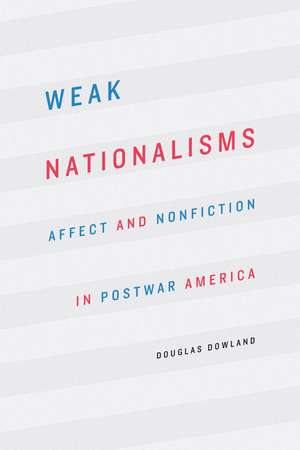Weak Nationalisms: Affect and Nonfiction in Postwar America
Autor Douglas Dowlanden Limba Engleză Paperback – 30 iun 2019
Weak Nationalisms explores the complex and dynamic ways in which emotions shape the post–World War II writing of the United States and argues that reading these narratives for their affects is to read for the emotional work that takes place between the part and the whole. Douglas Dowland employs a methodology that combines innovations in affect theory with traditional close reading practices to examine nonfiction texts by Simone de Beauvoir, John Steinbeck, Charles Kuralt, and Sarah Vowell and present the ways these writers negotiate nationalism in the United States. By reading these texts for their affects, Dowland makes visible the otherwise unseen rhetorical strategies that buttress the literary construction of the United States in contemporary nonfiction and articulates the function of synecdoche in establishing "weak nationalisms." Dowland examines how, as they write about otherwise plain objects in order to evoke and describe the entire nation, these authors both embrace core tenets of liberalism in the United States and resist the hierarchies often associated with nationalism.
In showcasing how synecdoche creates affective intensities, Weak Nationalisms challenges a popular conception in literary history that nonfiction narratives of the United States merely reflect the period of their production, renews questions literary criticism asks of texts, and offers new ways in which close reading answers these questions. Further, Dowland broadens the scope of close reading with affect theory and thereby enlivens the study of texts that literary criticism might otherwise dismiss as mere receptacles of strong nationalism. In the end, this book calls upon criticism to deal more attentively to the affects of texts, regardless of their genre, and to do so in a way that appreciates the open-ended, plural, analogic nature of the emotions.
In showcasing how synecdoche creates affective intensities, Weak Nationalisms challenges a popular conception in literary history that nonfiction narratives of the United States merely reflect the period of their production, renews questions literary criticism asks of texts, and offers new ways in which close reading answers these questions. Further, Dowland broadens the scope of close reading with affect theory and thereby enlivens the study of texts that literary criticism might otherwise dismiss as mere receptacles of strong nationalism. In the end, this book calls upon criticism to deal more attentively to the affects of texts, regardless of their genre, and to do so in a way that appreciates the open-ended, plural, analogic nature of the emotions.
| Toate formatele și edițiile | Preț | Express |
|---|---|---|
| Paperback (1) | 217.31 lei 6-8 săpt. | |
| Nebraska – 30 iun 2019 | 217.31 lei 6-8 săpt. | |
| Hardback (1) | 395.70 lei 6-8 săpt. | |
| Nebraska – 30 iun 2019 | 395.70 lei 6-8 săpt. |
Preț: 217.31 lei
Nou
Puncte Express: 326
Preț estimativ în valută:
41.59€ • 43.26$ • 34.33£
41.59€ • 43.26$ • 34.33£
Carte tipărită la comandă
Livrare economică 15-29 aprilie
Preluare comenzi: 021 569.72.76
Specificații
ISBN-13: 9781496215482
ISBN-10: 1496215486
Pagini: 288
Ilustrații: index
Dimensiuni: 152 x 229 x 21 mm
Greutate: 0.43 kg
Editura: Nebraska
Colecția University of Nebraska Press
Locul publicării:United States
ISBN-10: 1496215486
Pagini: 288
Ilustrații: index
Dimensiuni: 152 x 229 x 21 mm
Greutate: 0.43 kg
Editura: Nebraska
Colecția University of Nebraska Press
Locul publicării:United States
Cuprins
Introduction: Affected Readers in an Imagined Community
1. Moodiness: The Everyday America of Beauvoir’s America Day by Day
2. Curiosity and its Discontents: Steinbeck’s Travels with Charley and America and Americans
3. Hopefulness: On the Road with Charles Kuralt
4. Incredulity: Reading Sarah Vowell
Conclusion: Affected Critics: the Nation and the Limits of Critique
Works Cited
1. Moodiness: The Everyday America of Beauvoir’s America Day by Day
2. Curiosity and its Discontents: Steinbeck’s Travels with Charley and America and Americans
3. Hopefulness: On the Road with Charles Kuralt
4. Incredulity: Reading Sarah Vowell
Conclusion: Affected Critics: the Nation and the Limits of Critique
Works Cited
Notă biografică
Douglas Dowland is an associate professor of English at Ohio Northern University.
Recenzii
“In Weak Nationalisms, Douglas Dowland shows how largely a figure of speech—synecdoche—figures in the affective dimension of nationalism. . . . But where many studies of nationalism stress the obscured means through which these affective ties work, Dowland finds most interesting the ‘unmediated, tactile, sensuous engagement with the emotions’ evident in the nonfiction works he considers. With its interest in the persistence of national affect, Weak Nationalisms is a timely and important study.”—Priscilla Wald, R. Florence Brinkley Professor of English at Duke University
“How have citizens of the United States historically understood their relationship to the nation? The answer Weak Nationalisms gives is both elegantly specific and broadly compelling. This book is smart and timely. It draws out some of the most pressing issues Americans are currently tangling with in everyday life. It is an engaging, well-executed, and important book.”—Rachel Greenwald Smith, author of Affect and American Literature in the Age of Neoliberalism
“Weak Nationalisms makes visible a vibrant and underappreciated trajectory of literary nonfiction about the United States. Douglas Dowland effectively and persuasively presents the ways in which a range of writers negotiate a mode of nationalistic feeling that embraces core tenets of American liberalism, while resisting and questioning the hierarchies that we often associate with nationalism. The book offers a refreshing and timely reflection on the uses of ‘weak nationalism.’”—Daniel Worden, author of Masculine Style: The American West and Literary Modernism
